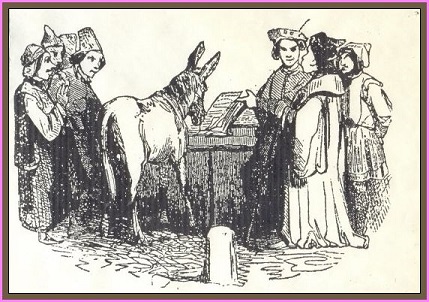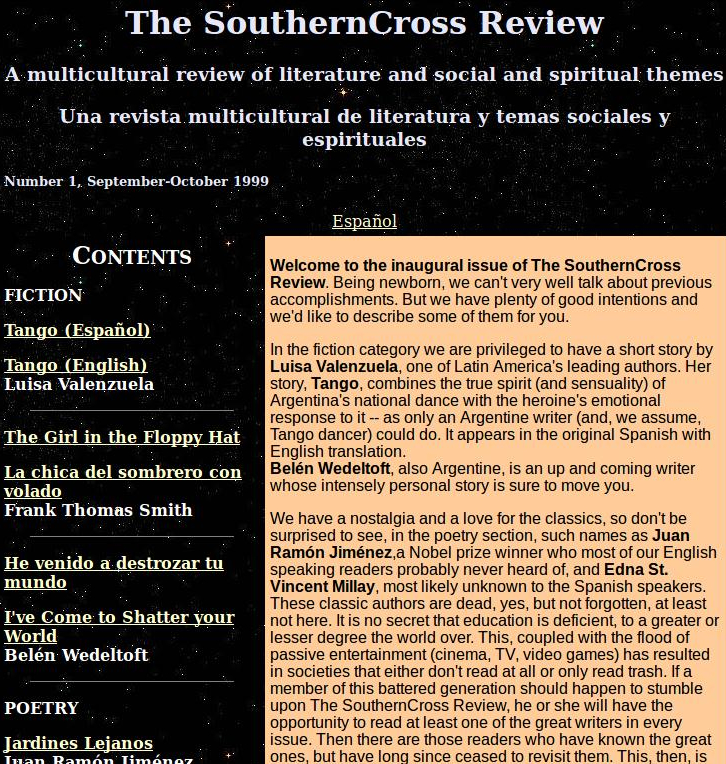Beyond Donald Trump (When Poisons Curdle) - by Andrew Bacevich
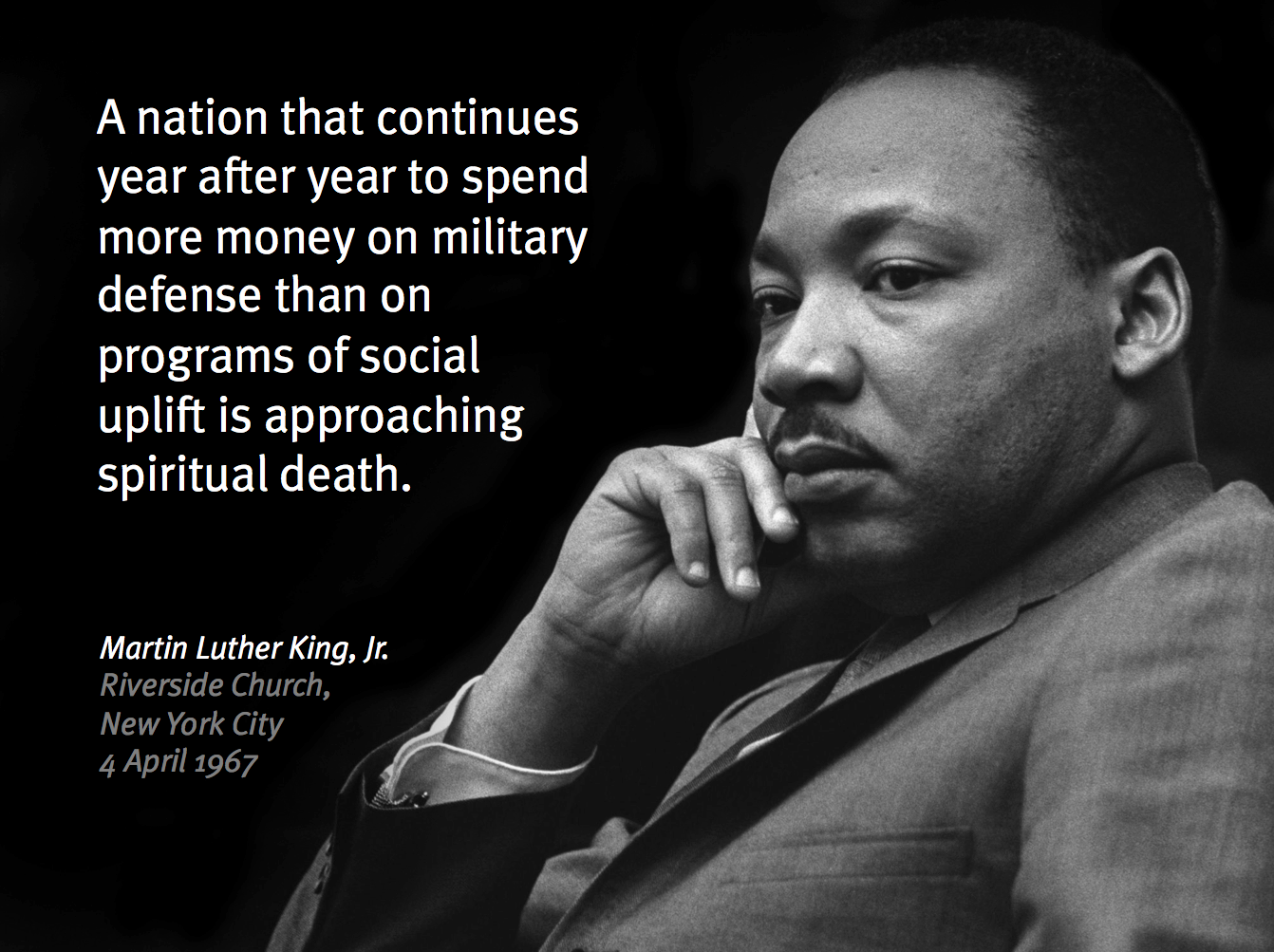
When Martin Luther King preached his famous sermon "Beyond Vietnam” at Riverside Church in New York City in April 1967, I don’t recall giving his words a second thought. Although at the time I was just up the Hudson River attending West Point, his call for a “radical revolution in values” did not resonate with me. By upbringing and given my status as a soldier-in-the-making, radical revolutions were not my thing. To grasp the profound significance of the “the giant triplets of racism, extreme materialism, and militarism” to which he called his listeners’ attention was beyond my intellectual capacity. I didn’t even try to unpack their meaning.
In that regard, the ensuing decades have filled a void in my education. I long ago concluded that Dr. King was then offering the essential interpretive key to understanding our contemporary American dilemma. The predicament in which we find ourselves today stems from our reluctance to admit to the crippling interaction among the components of the giant triplets he described in that speech. True, racism, extreme materialism, and militarism each deserve — and separately sometimes receive — condemnation. But it’s the way that the three of them sustain one another that accounts for our nation’s present parlous condition. Let me suggest that King’s prescription remains as valid today as when he issued it more than half a century ago — hence, my excuse for returning to it so soon after citing it in a previous TomDispatch. Sadly, however, neither the American people nor the American ruling class seem any more inclined to take that prescription seriously today than I was in 1967. We persist in rejecting Dr. King’s message.
Martin Luther King is enshrined in American memory as a great civil rights leader and rightly so. Yet as his Riverside Church Address made plain, his life’s mission went far beyond fighting racial discrimination. His real purpose was to save America’s soul, a self-assigned mission that was either wildly presumptuous or deeply prophetic.
In either case, his Riverside Church presentation was not well received at the time. Even in quarters generally supportive of the civil rights movement, press criticism was widespread. King’s detractors chastised him for straying out of his lane. “To divert the energies of the civil rights movement to the Vietnam issue is both wasteful and self-defeating,” the New York Times...
Continue reading
Don't forget to so we can advise you when the next issue is ready!
You can find us under the Southern Cross in the Traslasierra Valley, Province of Córdoba, Argentina. Visitors always welcome. Just follow the sign that reads: La Cruz del Sur.
Frank Thomas Smith, Editor
Features
Sojourn in the South by a Yankee, a Jew and a Negro
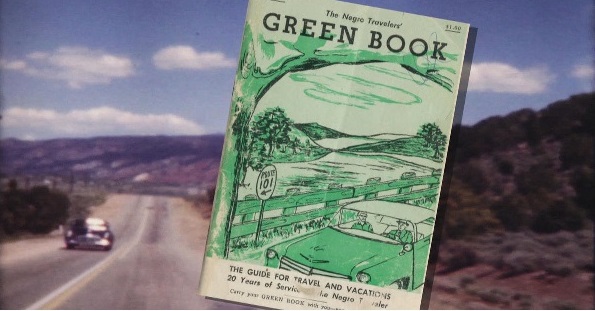
This article was first published in SouthernCrossReview.org in 2014. It's appearing here again – somewhat updated – for two reasons. The sojourn described in the article took place in 1953 – sixty-eight years ago. It tells of a true experience of racism as it was then in the south of the United States. Today we almost daily read of incidents involving racism, often due to aggressive police brutality. And yet, racism was much worse then. Those days, before Martin Luther King and all the other activists who used non-violent resistance successfully mostly, who would not have been called insane if they said that sixty years later a black guy named Barack Hussein Obama would be elected president of the United States? The other reason is that I just received a request from my grandson for information I might have about racism in the United States for a project he is preparing for his Berlin High school. Well yes, I do have something, not scholarly, but personal and real...
Continue.
With Liberty and Justis for all?
How Spanish Can Help Us Survive Viral Times
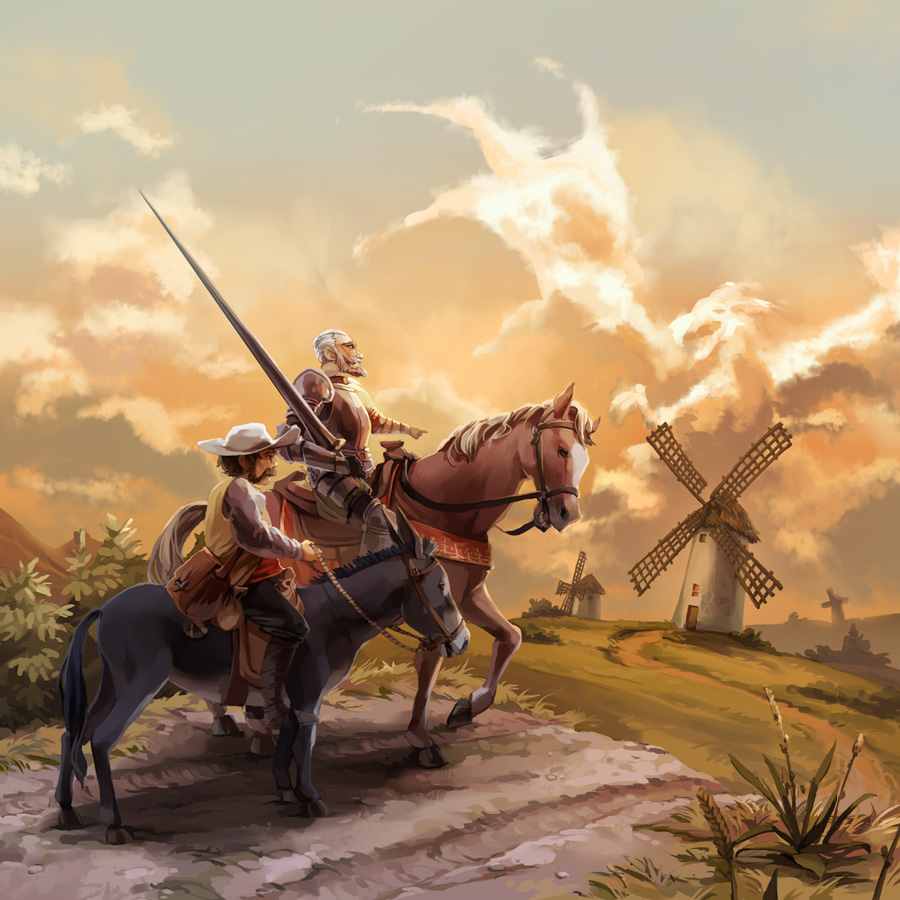
“Una nación bajo Diós, indivisible, con libertad y justicia para todos.”
When Jennifer López shouted out that last line of the Pledge of Allegiance in Spanish during Joe Biden’s inauguration ceremony, like so many Spanish-speaking Latinos in the United States I felt a sense of pride, a sense of arrival. It was a joy to hear my native language given a prominent place at a moment when the need to pursue the promise of “liberty and justice for all” couldn’t be more pressing.
A sense of arrival, I say, and yet Spanish arrived on these shores more than a century before English. In that language, the first Europeans explorers described what they called “el Nuevo Mundo,” the New World — new for them, even if not for the indigenous peoples who had inhabited those lands for millennia, only to be despoiled by the invaders from abroad. The conquistadors lost no time in claiming their territories as possessions of the Spanish crown and, simultaneously, began naming them.
Much as we may now deplore those colonial depredations, we still regularly use the words they left behind without considering their origins. Florida, which derives from flor, flower in Spanish, because Ponce de León first alighted in Tampa Bay on an Easter Sunday (Pascua Florida) in 1513. And then there is Santa Fe (Holy Faith) and Los Angeles (the Angels), founded in 1610 and 1782 respectively, and so many other names that we now take for granted: Montana (from montañas), Nevada (from nieve, or snow), Agua Dulce, El Paso, and Colorado, to name just a few. And my favorite place name of all, California, which comes from a legendary island featured in one of the books of chivalry that drove Don Quixote, the character created by Miguel de Cervantes, mad and set him on the road to seek justice for all...
Continuar
Fiction
The Shallow End

Carson could see that Tyler was getting nervous and that he was starting to lose him. The nods of the head continued, but they had slipped to slow motion velocity. After a few moments Tyler stopped nodding altogether, then turned his head to the side and started breathing a little more heavily. The details of Carson’s plan were clearly diminishing Tyler’s enthusiasm to participate in that plan.
“It’s definitely gonna work, dude. I swear it. Nobody will get hurt, and the Chinks won’t even miss what they lose. And we come out much better with what they do lose.”
“Yeah, yeah, I get all that,” Tyler replied. “It’s just that this is something big. I mean, it’s armed robbery, right? Going in there with a gun, somebody could really get hurt. And that’s a real mess.”
“But nobody’s gonna get hurt, dude. That’s why we’re gonna hit a Chinese take-out place. It’s a pushover, a done deal, places like that.”
“How do you know no one’s gonna get hurt.”
“Are you even listening to me? How many times I gotta tell you, the Chinese won’t give you any trouble. They can’t. It’s something in their culture, some Asian thing. They can’t deal with sudden violence. They’re especially scared of blacks, but us whites, too. They think we’re just so much better at violence, they give up right away. You scowl at them, curse a bit, and they’ll give you what you want: extra beef, extra peanuts in your kung pao. And then you point a gun at them … they give you whatever you’re asking for...”
Continue
A Streetcar Named Karma
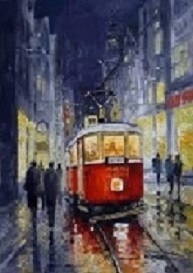
A lecture wasn't exactly what I had in mind for the evening, but there we were, Katrina and I, approaching the hall where it was to take place. A full moon shone into the narrow cobblestoned street. Its presence more or less guaranteed that there would be no more snow that night. That same day, I think it was early afternoon, I had boarded a streetcar and found a spot among the standees, when the clasp on my briefcase somehow opened as we rounded a sharp curve and the books and papers tumbled out. I bent to retrieve them and fell against another standee, knocking her over and falling almost on top of her. I stammered apologies in German, my native tongue, instead of Czech. My reaction was automatic, but the fact is that in that enlightened age all educated people in Prague spoke German. Hers was lightly accented. She helped me pick up my things, which were strewn around and soiled by the slush the passengers' shoes had tracked into the car. An elderly couple vacated a double seat at the next stop and I quickly grasped the hand-guard and invited her to sit next to the window. I took my place next to her on the aisle. She wasn't a beautiful woman, at least not in the usual sense. You could have called her attractive though. Her most salient feature was her smile, wide and spontaneous, lighting up her face. Though she wore a heavy fur coat against the cold, I could tell that she was somewhat plump, which was to my taste. The bump, the fall and the shared retrieval task had served as an icebreaker, so I introduced myself and we talked and laughed about it and, naturally, I invited her to join me in one of those delightful Prague cafés for coffee and cake. But she pleaded a previous engagement, so I asked her to go with me to the theater that evening. She blushed, smiled, and said yes. When we reached her stop she started to get off, but at the door she turned and said, quickly, "No, don't buy the tickets, but we'll meet there anyway. I'll explain later." The doors opened and she stepped down and out. I noticed some of my fellow passengers smirking, but I didn't care, I was already in love - at first sight, as they say. A little boy sitting on the aisle stared at me with a fey look. I looked at him inquiringly and he turned away... Continue
A Councilman and Aesop
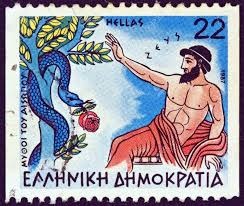
There are men who thrive on the attack and retreat of the law-making process. I, on the other hand, would much rather tend my olive groves and leave the warfare over laws to those who enjoy it. But the law is the law. And when the Clerk of the Assembly came to me and told me it was my turn to serve on the Council, I did not welcome the news. Yes, I admire Solon and believe the reforms he gave us have made us a better people. And it is true that Tigani is not far away. I could spend a year on the council while keeping one eye on my business. But that is not my preference. Still, deep in my heart, I knew that the law that required me to serve was just. I would not walk away from my responsibility.
When I arrived in Tigani, I was hungry from the long walk. I went to the agora and soon found a stall where a man was selling dates. I headed toward it, but another man blocked my path.
“You are Thoth, yes?” he said.
“Yes. Who are you?”
“I wanted to talk to you about a law to be discussed in Council. You see, there have been problems lately with servants of some of our men of high standing.”
“You mean the slaves of wealthy men?”
He looked down and laughed dryly. “That’s such a harsh word,” he said...
Continue
Anthroposophy
Emmanual Swedenborg
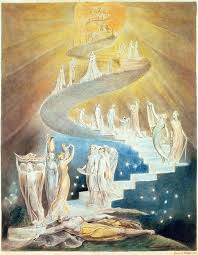
Today I would like to talk about difficulties encountered in attempting to enter the spiritual worlds, and I will begin with a specific example. All of you will have heard of the seer Swedenborg. I have often talked about him and have always emphasized that a personality like Swedenborg is not to be dismissed lightly. On the other hand, for those who really want to know what it takes to gain access to the spiritual worlds, visionaries like Swedenborg can serve as an example of how people can still be subject to all kinds of illusions in spite of having entered the spiritual world. The spiritual world is open to them, but that does not mean they are able to break free from the world of illusion.
I said that Swedenborg is not to be taken lightly. He was not one of those seers who lightheartedly give in to their visionary gifts without knowing much about life or about the world. Swedenborg was a profound thinker and an important scholar, certainly one of the greatest of his time, if not the very greatest. His scholarly knowledge encompassed everything the science of his day had to offer. A whole committee of experts has recently been formed to prepare for publication, not what Swedenborg left behind as a seer, but his purely scientific writings — substantial proof indeed of his well-founded scientific approach and striving for the truth...
Continue
Words and Music
Pennies From Heaven

A long time ago, a million years B.C
The best things in life were absolutely free
But no one appreciated a sky that was always blue
And no one congratulated a moon that was always new
So it was planned that they would vanish now and then
And you must pay before you get them back again
That's what storms were made for
But you shouldn't be afraid for:
Every time it rains it rains
Pennies from heaven,
Don't you know each cloud contains
Pennies from heaven...
Continue reading lyrics and Listen to Billie Holliday
Poetry
My Loves

I love to see the big white moon,
A-shining in the sky;
I love to see the little stars,
When the shadow clouds go by.
I love the rain drops falling
On my roof-top in the night;
I love the soft wind’s sighing,
Before the dawn’s gray light.
I love the deepness of the blue,
In my Lord’s heaven above;
But better than all these things I think,
I love my lady love...
Continue
The Last Letter

Alma,
after all
that has been between us,
after all
we have already said,
not even I know
why I am writing to you,
but I cannot omit doing so,
and I am sending you this
as the last
of my letters.
My life and my deeds,
although on everyone's lips,
are disdained and wasted.
If they did not know the truth,
though as in a dream,
they would have no guilt.
But now they know
and are guilty,
thereby profaning my love...
Continue
